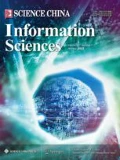Abstract
In this paper, we investigate the problem of achieving node-to-node consensus (NNC) in two-layer multiple-input-multiple-output (MIMO) multi-agent systems (MASs) with Lipschitz nonlinear dynamics and intermittent directed networks, where the cooperative goal is to make each follower to track a specified leader. By using the relative outputs, discontinuous observers are given to reconstruct the full states of followers and then feedback controllers are designed. Furthermore, some NNC criteria are given by investigating stability of the error system. To verify the obtained results, a simulation is performed.
Similar content being viewed by others
References
Cao Y, Yu W, Ren W, et al. An overview of recent progress in the study of distributed multi-agent coordination. IEEE Trans Ind Inf, 2013, 9: 427–438
Yu W W, Wang H, Hong H F, et al. Distributed cooperative anti-disturbance control of multi-agent systems: an overview. Sci China Inf Sci, 2017, 60: 110202
Ren W, Beard R W. Consensus seeking in multiagent systems under dynamically changing interaction topologies. IEEE Trans Automat Contr, 2005, 50: 655–661
Li Z, Wen G, Duan Z, et al. Designing fully distributed consensus protocols for linear multi-agent systems with directed graphs. IEEE Trans Automat Contr, 2015, 60: 1152–1157
Ma J, Ye M, Zheng Y, et al. Consensus analysis of hybrid multiagent systems: a game-theoretic approach. Int J Robust Nonlin Control, 2019, 29: 1840–1853
Xu W, Ho D W C, Zhong J, et al. Event/self-triggered control for leader-following consensus over unreliable network with DoS attacks. IEEE Trans Neural Netw Learn Syst, 2019, 30: 3137–3149
Zheng Y, Ma J, Wang L. Consensus of hybrid multi-agent systems. IEEE Trans Neural Netw Learn Syst, 2018, 29: 1359–1365
Cao M, Morse A S, Anderson B D O. Reaching a consensus in a dynamically changing environment: a graphical approach. SIAM J Control Opt, 2008, 47: 575–600
Zhou J L, Yang J Y, Li Z. Simultaneous attack of a stationary target using multiple missiles: a consensus-based approach. Sci China Inf Sci, 2017, 60: 070205
Wang F Y, Liu Z X, Chen Z Q. Leader-following consensus of second-order nonlinear multi-agent systems with intermittent position measurements. Sci China Inf Sci, 2019, 62: 202204
Yu Y R, Peng S T, Dong X W, et al. UIF-based cooperative tracking method for multi-agent systems with sensor faults. Sci China Inf Sci, 2019, 62: 010202
Zhou J, Lu J A, Lü J. Pinning adaptive synchronization of a general complex dynamical network. Automatica, 2008, 44: 996–1003
Yu W, Cao J, Luü J. Global synchronization of linearly hybrid coupled networks with time-varying delay. SIAM J Appl Dyn Syst, 2008, 7: 108–133
Dong X, Yu B, Shi Z, et al. Time-varying formation control for unmanned aerial vehicles: theories and applications. IEEE Trans Contr Syst Technol, 2015, 23: 340–348
Yang S, Tan S, Xu J X. Consensus based approach for economic dispatch problem in a smart grid. IEEE Trans Power Syst, 2013, 28: 4416–4426
Yu W, Chen G, Cao M. Some necessary and sufficient conditions for second-order consensus in multi-agent dynamical systems. Automatica, 2010, 46: 1089–1095
Wen G, Duan Z, Chen G, et al. Consensus tracking of multi-agent systems with Lipschitz-type node dynamics and switching topologies. IEEE Trans Circ Syst I, 2014, 61: 499–511
Li Z, Duan Z, Ren W, et al. Containment control of linear multi-agent systems with multiple leaders of bounded inputs using distributed continuous controllers. Int J Robust Nonlin Control, 2015, 25: 2101–2121
Cao Y, Stuart D, Ren W, et al. Distributed containment control for multiple autonomous vehicles with doubleintegrator dynamics: algorithms and experiments. IEEE Trans Contr Syst Technol, 2011, 19: 929–938
Mei J, Ren W, Li B, et al. Distributed containment control for multiple unknown second-order nonlinear systems with application to networked Lagrangian systems. IEEE Trans Neural Netw Learn Syst, 2015, 26: 1885–1899
Luü H, He W, Han Q L, et al. Finite-time containment control for nonlinear multi-agent systems with external disturbances. Inf Sci, 2020, 512: 338–351
Zuo S, Song Y, Lewis F L, et al. Adaptive output containment control of heterogeneous multi-agent systems with unknown leaders. Automatica, 2018, 92: 235–239
Shao J, Shi L, Zheng W X, et al. Containment control for heterogeneous multi-agent systems with asynchronous updates. Inf Sci, 2018, 436–437: 74–88
Wang D, Wang W. Necessary and sufficient conditions for containment control of multi-agent systems with time delay. Automatica, 2019, 103: 418–423
Wen G, Yu W, Wang J, et al. Distributed node-to-node consensus of multi-agent systems with time-varying pinning links. Neurocomputing, 2015, 149: 1387–1395
Wan Y, Wen G, Cao J, et al. Distributed node-to-node consensus of multi-agent systems with stochastic sampling. Int J Robust Nonlin Control, 2016, 26: 110–124
Liu H, Wan H, Tse C K, et al. An encryption scheme based on synchronization of two-layered complex dynamical networks. IEEE Trans Circ Syst I, 2016, 63: 2010–2021
Wen G, Li Z, Duan Z, et al. Distributed consensus control for linear multi-agent systems with discontinuous observations. Int J Control, 2013, 86: 95–106
Wen G, Zheng W X. On constructing multiple Lyapunov functions for tracking control ofmultiple agents with switching topologies. IEEE Trans Automat Contr, 2019, 64: 3796–3803
Plemmons R J. M-matrix characterizations. I—nonsingular M-matrices. Linear Algebra Appl, 1977, 18: 175–188
Wen G, Yu W, Xia Y, et al. Distributed tracking of nonlinear multiagent systems under directed switching topology: an observer-based protocol. IEEE Trans Syst Man Cybern Syst, 2017, 47: 869–881
Acknowledgements
Lingling YAO was supported by National Natural Science Foundation of China (Grant No. 11601077) and Natural Science Foundation of Jiangsu Province (Grant No. BK20160662). Peijun WANG was supported by Scientific Research Foundation for Scholars of Anhui Normal University and Natural Science Foundation of Anhui Province (Grant No. 2008085QF304).
Author information
Authors and Affiliations
Corresponding author
Rights and permissions
About this article
Cite this article
Yao, L., Wang, P. Observer-based node-to-node consensus of multi-agent systems with intermittent networks. Sci. China Inf. Sci. 63, 212204 (2020). https://doi.org/10.1007/s11432-019-2845-6
Received:
Revised:
Accepted:
Published:
DOI: https://doi.org/10.1007/s11432-019-2845-6



